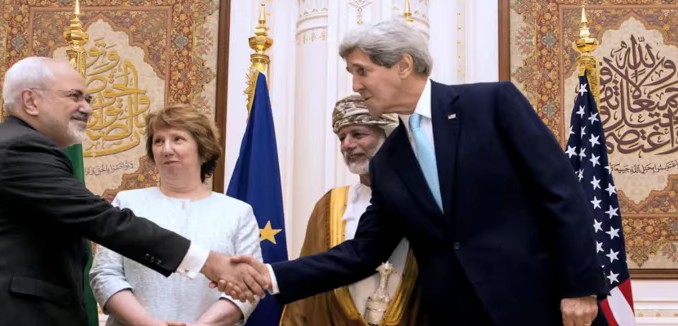In an analysis (Google link) of the secret diplomacy between the United States and Iran that led to the nuclear talks, The Wall Street Journal today reported that in order to build confidence with Iran, the United States expedited the release of four Iranians, among them convicted arms smugglers, who were held in U.S. and U.K. custody. During the talks, which were facilitated by the government of Oman, Iran held three American hikers, eventually releasing them when Oman paid $500,000 bail for each of them.
Iran also campaigned for the release of Shahrzad Mir Gholikan, who was convicted in 2009 and sentenced to more than five years for illegally exporting night-vision equipment to Iran from Europe. Iranian state TV showed one of the American hikers in custody, Sarah Shourd, posing with Ms. Gholikan’s twin daughters and calling for their mother’s release.
Ms. Gholikan returned to Iran via Oman in August 2012, nearly a year after Ms. Shourd’s release. U.S. officials denied it was a prisoner swap because Ms. Gholikan had served her sentence.
Sarah Shourd, Joshua Fattal, and Shane Bauer were the three American hikers who had strayed across the Iranian border and were consequently imprisoned for two years. While the United States denied that the release of the Iranian smugglers for the hikers was a trade, Fattal said that the releases were seen as “goodwill gestures.”
When Mojtaba Atarodi, an Iranian professor who had been arrested for shipping prohibited items to Iran, was released, he said that he was not swapped for former Marine Amir Hekmati because, “he is a spy, but I have done nothing wrong.” Hekmati, who is serving a ten year sentence in the notorious Evin Prison, denies that he was spying. In addition to Hekmati, Iran holds at least two other Americans captive, including Washington Post reporter Jason Rezaian.
The maneuvering over the prisoners was seen as a means to enable President Barack Obama to use diplomacy to limit Iran’s nuclear program. The administration also facilitated visas for Iranian students to study in the United States. The number of Iranian students in American universities has more than doubled since 2011 to over 10,000.
Despite the confidence building measure taken by Washington, the initial direct meeting between American and Iranian diplomats in July of 2012 on Iran’s nuclear program was “largely a failure.” In addition, “[t]he Obama administration initially called for an end to Tehran’s nuclear fuel production, a dismantling of many of its facilities and a rollback of its missile program—goals that have been dropped.”
In the wake of the understandings agreed to in Lausanne in April, President Barack Obama said that “Iran has also agreed to the most robust and intrusive inspections and transparency regime ever negotiated for any nuclear program in history.” However, Iran’s top leaders have ruled out allowing inspections necessary to verify the emerging deal with the P5+1 nations.
Last Sunday, Iran’s parliament voted against allowing inspections of military sites. Brig. Gen. Hossein Dehghan, Iran’s defense minister, and Behrouz Kamalvandi, the spokesman for the Atomic Energy Organization of Iran, both declared military sites as off-limits to international inspectors. Last week, Iran’s Supreme Leader, Ayatollah Ali Khamenei, also refused a number of measures necessary to ensure that the emerging deal would prevent Iran from developing a nuclear weapon.
Yesterday, Iran’s foreign minister and chief nuclear negotiator Mohammad Javad Zarif returned to Tehran for consultations over Khamenei’s latest demands.
[Photo: wochit News / YouTube ]




